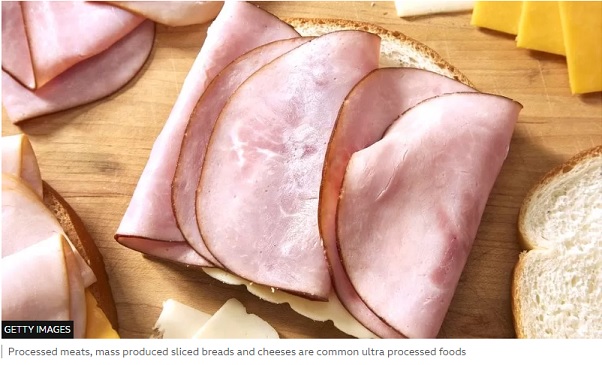
"It's a bit scary isn't it after only two weeks to see those results."
Aimee, 24, has spent two weeks on an ultra-processed diet as part of a test carried out by scientists from King's College London for BBC Panorama.
Her identical twin, Nancy, was also on a diet containing exactly the same amount of calories, nutrients, fat, sugar and fibre - but she was consuming raw or low-processed foods.
Aimee gained nearly a kilo in weight - Nancy lost weight. Aimee's blood sugar levels also worsened and her blood fat levels - lipids - went up.
This was a short-term study on just one set of twins, but the results highlight growing fears among some scientists about the possible impact of so-called ultra-processed foods on our health, which BBC Panorama has been investigating.
Prof Tim Spector, is a professor of epidemiology at King's College London, who studies trends in disease and oversaw the test.
He told BBC Panorama: "In the last decade, the evidence has been slowly growing that ultra-processed food is harmful for us in ways we hadn't thought.
"We're talking about a whole variety of cancers, heart disease, strokes, dementia."
The term ultra-processed foods - or UPF - was only coined 15 years ago but it makes up about half the things we now eat in the UK.
From sliced brown bread to ready meals and ice cream, it is a group of foods made with varying - but often substantial - levels of industrial processing. Ingredients used, such as preservatives, artificial sweeteners and emulsifiers, do not typically feature in home cooking.
"Ultra-processed foods are among the most profitable foods companies can make," says Prof Marion Nestle, a food politics expert and professor of nutrition at New York University.
As our consumption of ultra-processed foods go up - the UK is one of the biggest consumers per head in Europe - so have rates of diabetes and cancer.
Some academics think the link is not coincidental.
In January, one of the most comprehensive studies on ultra-processed food - by Imperial College's School of Public Health - was published in The Lancet medical journal.
The study of 200,000 UK adults found that higher consumption of ultra-processed foods may be linked to an increased risk of developing cancer overall, and specifically ovarian and brain cancers.
And, as of last month, the World Health Organization (WHO) is now cautioning against the long-term use of artificial sweeteners - citing potential health risks.
It follows dozens of studies linking increasing consumption of UPF to increased risk of developing serious illnesses.
But proving that specific ingredients cause human harm can be challenging - there are a range of other factors in our lifestyles that can cause these diseases. For example: lack of exercise, smoking or sugary diets.
Common ultra-processed foods:
- Mass-produced bread and sweetened breakfast cereals
- Instant soups, pre-packaged and microwave ready meals
- Fruit-flavoured yogurts
- Reconstituted meat - like ham and sausages
- Ice cream, crisps and biscuits
- Soft drinks and some alcoholic drinks - like whisky, gin, and rum
The first investigations into mortality and consumption of ultra-processed food started in France at the University Sorbonne Paris Nord, as part of the ongoing study into the eating habits of 174,000 people.
"We have 24-hour dietary records during which they tell us all the foods, the beverages and so on, that they are eating," explains Dr Mathilde Touvier who heads up the study.
The ongoing research has already published results showing UPF may drive an increased burden of cancer.

